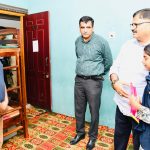Dr Toyeba Mushtaq, originally from Kashmir, works with a UK-based organisation which promotes independent cinema or parallel cinema in the UK and promotes South Asian cinema around the world. She works to bring the best of South Asian cinema to the UK audience. To know more about her journey and accomplishments, Rising Kashmir’s reporter Shafat Malik is in Conversation with Dr Toyeba Mushtaq.
- Tell us about yourself and your Journey from Kashmir to Cinema?
An introvert, who is an avid reader and a film buff is how I would like to introduce myself. Growing up I struggled massively with everyone’s love for science and my under-appreciated love for social sciences. Back in my school days, social sciences were looked down as a stream of interest for weaker students, and I had massive opposition from friends and family likewise when I chose to pursue my Bachelor’s in Mass Communication. That was the start of my exploration of arts and creatives and I never looked back. I have a BA (Hons.) in Mass Communication and Journalism, MA in Communication. MPhil in Television Studies and PhD in Film Studies.
My love for films grew during my early graduation days which dwelled into research and exploration during my masters degree. It was Film Appreciation classes during my Master’s that opened my vision to understand that there’s more to cinema than just entertainment.
- Growing up in Kashmir, how did your surroundings, experiences shape your interest in cinema and its promotion?
Born in the late 80’s we had no access to cinemas or theatre in the valley unfortunately. It was just Doordarshan back then, and films were telecast over the weekend. The 90’s saw the boom of cable television but the choices of films shown were limited and repetitive; not forgetting the problematic cinema and stories we had back then. I am glad that I at least didn’t understand the deeper meanings of films back then, but am terrified to even think about the impact it had on grown audiences in general. It was only when I moved out of the valley for my graduation that I began to watch films religiously but also wisely chose what to watch and what not to. Ask any film buff, we know that actual gems never see the light of the day in India whether it’s because of sensitive/taboo topics or zero to little budget of the films.
Q.Can you share a pivotal moment or memory that inspired you to take the path of promoting South Asian cinema while coming from a region like Kashmir?
A lot of it came from the fact that I specialized in electronic media production and that’s when I understood the nuances of reading between the lines and understanding the deeper meaning of any shot or lighting or music or dialogue used in the films. I made a few documentaries during my Master’s and it’s only when you witness the whole process of pre-production – production – post-production you realize the importance of things used in a frame which get usually ignored by a common eye. I remember watching Guru Dutt’s Sahib Biwi aur Ghulam and fell in love with his use of lighting to enunciate the feeling in various shots. Similarly Satyajit Ray’s Charulata had a huge impact on me through the metaphorical dialogue delivery and cinematography, especially the close-ups, as a casual viewer and transformed me into a curious viewer.
- How do you find a balance between your Kashmiri identity and your role as a promoter of South Asian cinema? Are there any intersections between the two?
Coming from a society that is predominantly patriarchal and conservative about how we go about our day to day, it hasn’t been an easy journey. Over time, my family and close friends have started to support me and cheered for me. Kashmir hasn’t had a strong hold in cinema but we do have great documentaries coming out of the place . I would however like to see the social structure of Kashmir in films. War and politics have been predominant themes for films based in Kashmir, but the softer and underrepresented areas is what I would love to see. Our history, culture, arts – there is such richness and diversity that the world needs to know and see.
Q.Being from a place with unique challenges, how has your background influenced your approach to promoting cinema and cultural representation?
As I said earlier, my decision to pursue a career as a social scientist as opposed to the infamous ‘being a doctor’ was not supported initially by my parents. But, over the time they have come around and supported me in my pursuit. They have stood by my side through thick and thin regardless of what people say.
I work for an organization which promotes independent cinema or parallel cinema in the UK. Growing up in Kashmir, I understand the importance of having a voice or telling a story; I respect debut filmmakers who take risks and question the status quo.
Media is meant to be the fourth pillar in any democracy and it should have full liberty to have a voice of dissent.
I know and understand what it means to take a solo path often with no clear answers, no financiers, no big names attached to the film but just poignant and bold storylines.
Q.What personal strengths or qualities do you think you’ve developed as a result of your experiences in both Kashmir and the world of cinema promotion?
Being open to world cinema and knowing that Indian cinema is beyond Bollywood has helped me massively as a researcher.
I am a huge fan of Iranian films, their protagonists or any characters are nothing like we see in Bollywood or Hollywood yet most of the stories are so profound. I have watched some incredible films from Sri Lanka or Bangladesh that most of us haven’t heard about. Your willingness to go an extra mile to find these films that you won’t find in any commercial theatre is what will make you a better researcher.
All these years of formal and informal training to have a critical eye while I watch films has helped me pick things that others might miss. In my organisation, after we watch films, we always sit together and discuss our perspectives and experiences from the film. It’s amusing when you realize how people see things so differently; it redefines that whatever you watch is very subjective to every audience and might mean altogether a different thing to them.
- In your journey of promoting South Asian cinema in the UK, are there specific moments where you’ve drawn on your Kashmiri roots to connect with audiences or filmmakers?
During the UK Asian Film Festival 2023, we had two films – a documentary Trans Kashmir and a feature Film I’m Not River Jehlum – premiere at our festival. I was incredibly proud that two stories, entirely different narratives, made it to the festival and were seen and appreciated by the audience in the UK.
I have a lot of colleagues working in universities where students are drawn to Kashmir and want to pursue research on the topic – be it the political turmoil of the place or Sufism or poetry on Kashmir. I often tell them to visit Kashmir and spend time here. I believe till you haven’t been to Kashmir, stood on the same soil, breathed the same air, lived through the same challenges, you can’t really be a researcher on anything related to Kashmir.
- What kind of impact do you hope to make, not just in the realm of cinema, but also in representing the resilience and creativity of Kashmiris?
I hope to bring a positive change and a possibility to dream that your willingness and perseverance can take you places; that no dream is too small or too big and that there is also a world beyond just print or television journalism.
Kashmiris are known for their brilliance and intelligence throughout the world. Despite the social and political turmoil, Kashmiris have paved their way and shone nationally and internationally.
I see young people especially women writing, doing photography, being entrepreneurs and being artists; it fills my heart with content and happiness to see how far we have already come.
- What message or example do you hope to set for other young Kashmiris who may have dreams that extend beyond the region’s struggles?
Don’t give up on your dreams and aspirations even though the road to it is less traveled. At the same time be pragmatic about your ambitions, you will have to work harder for unconventional goals. Life is all about learning and being a better version of yourself than you were before. You are your competition, don’t feel threatened by other’s achievements; cheer for them and wait for your time to shine.
Lastly, cinema has evolved and so have we as audiences. Give good stories a chance to be seen and discussed.








